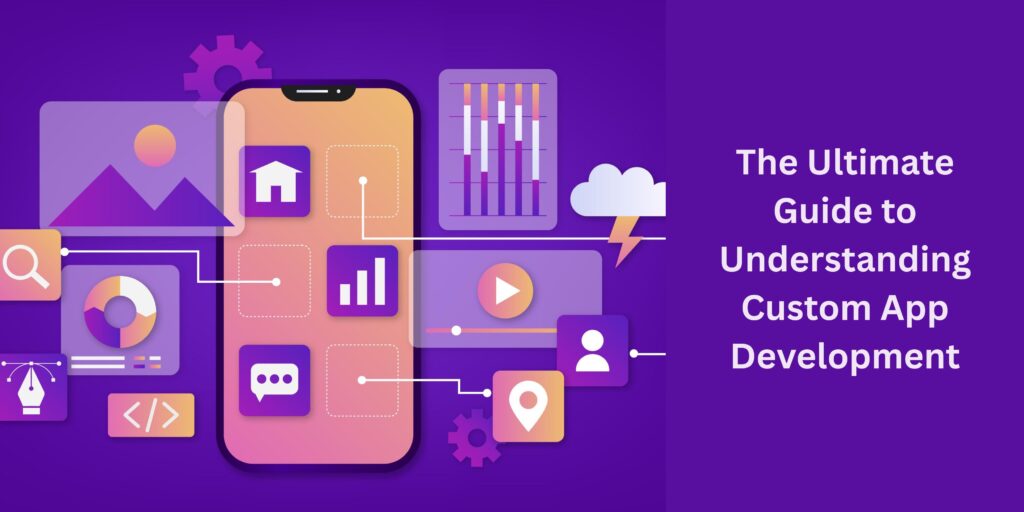In the fast-paced digital world, businesses are increasingly turning to custom app development to meet their unique needs. Off-the-shelf software may solve some problems, but for many companies, these pre-made solutions often fall short in terms of flexibility, scalability, and adaptability. This is where custom app development comes into play, providing businesses with tailored solutions that align perfectly with their goals.
If you’ve ever wondered what custom app development is, why it’s so important, and how to go about it, this ultimate guide will walk you through everything you need to know.
What is Custom App Development?
Custom app development refers to the process of creating software applications specifically designed to meet the individual needs of a business or organization. Unlike off-the-shelf software, which is designed to serve a broad range of users, custom apps are built to address a particular set of requirements, ensuring that they are as efficient, scalable, and effective as possible. A custom app development company plays a crucial role in this process, collaborating closely with businesses to understand their specific needs and creating solutions tailored to their unique challenges.
Key Features of Custom App Development
- Tailored to Specific Needs: Unlike generic apps, custom applications are built from the ground up to cater to a business’s specific needs. Whether you need complex workflows, integration with existing systems, or a unique user interface, a custom app can handle all of that.
- Flexibility and Scalability: Custom apps are highly adaptable and can be easily scaled as your business grows. Whether you’re adding new features, expanding user capacity, or integrating with new technologies, custom apps are designed to evolve alongside your business.
- Better Integration with Existing Systems: Custom apps can be seamlessly integrated with your existing tools and software, ensuring that everything works together harmoniously. This reduces the need for manual data entry, cuts down on errors, and streamlines operations.
- Improved Security: Security is always a top concern for businesses, and custom app development allows you to implement the security features that are most relevant to your business. Custom apps can be designed with built-in security measures, encryption, and compliance with industry-specific regulations.
- Enhanced User Experience: Custom apps provide a user experience tailored to your target audience. With customized features, design, and user flows, these apps can optimize the way users interact with your business, improving engagement and satisfaction.
Why Custom App Development Matters
Now that we’ve covered what custom app development is, let’s explore why it’s so important for businesses. In today’s competitive landscape, relying solely on off-the-shelf solutions can limit your company’s potential. Here are some reasons why custom app development is crucial:
1. Competitive Advantage
Custom applications give you a significant edge over competitors using generic software. With unique features, better user experiences, and smoother integrations, custom apps can streamline your operations, boost productivity, and enhance customer satisfaction, helping you stand out in a crowded market.
2. Increased Efficiency and Productivity
When a business uses an off-the-shelf solution, it often has to compromise on features and functionalities that would optimize operations. Custom apps, on the other hand, are designed specifically to meet your requirements, which means you can eliminate bottlenecks, reduce redundancies, and automate tedious tasks. This leads to improved efficiency and productivity across your organization.
3. Future-Proofing Your Business
Technology is constantly evolving, and businesses need to stay ahead of the curve. Custom app development ensures that your software is adaptable to new technologies, industry trends, and user expectations. As your business grows and your needs evolve, your custom app can evolve with it, ensuring that you remain competitive and up-to-date.
4. Cost-Effectiveness in the Long Run
While the initial investment in custom app development may be higher than purchasing off-the-shelf software, it often proves to be more cost-effective in the long run. Custom apps eliminate the need for workarounds, unnecessary subscriptions, or the purchase of multiple software packages, all of which can add up over time.
5. Better Customer Experience
When you create a custom app, you have the opportunity to build it around the specific needs and pain points of your customers. With features designed to improve their experience, you can build a stronger connection with your audience, increase user satisfaction, and even boost customer loyalty.
The Custom App Development Process
Now that you understand why custom app development is important, you may be wondering how the process works. While every project is different, custom app development typically follows a series of stages:
1. Discovery and Planning
The first step in custom app development is understanding the business’s needs, goals, and challenges. This stage involves extensive discussions between the development team and the business to gather requirements and define objectives. It’s essential to identify the core features, target audience, and key performance indicators (KPIs) before moving forward.
During this phase, you’ll also determine the platform (mobile, web, or desktop), choose the technology stack, and define the project scope. Clear communication at this stage ensures that everyone is on the same page and that the project stays on track.
2. Design
Once the planning phase is complete, the design phase begins. This is where the look and feel of the app are conceptualized. The development team will create wireframes, user flows, and prototypes to give stakeholders a visual representation of the app.
The design phase is an opportunity to focus on user experience (UX) and user interface (UI) design. A good UX/UI design ensures that the app is not only aesthetically pleasing but also intuitive and easy to use. User feedback during this stage is crucial to refining the design before moving on to development.
3. Development
This is where the magic happens. During the development phase, the development team writes the code, builds the app’s infrastructure, and incorporates all the necessary features. This phase can take a few weeks to several months, depending on the complexity of the app and the resources allocated to the project.
Development is typically done in stages, with regular updates and milestones to ensure that the project is progressing as expected. The team will also perform unit testing and quality assurance (QA) to ensure that the app is functioning as intended.
4. Testing
Before the app is launched, extensive testing is necessary to ensure its quality. Testing includes checking for bugs, performance issues, and security vulnerabilities. It also involves usability testing to ensure that the app is user-friendly and meets the business’s goals.
Testing is an ongoing process throughout the development cycle, with iterative testing taking place as features are developed. This helps identify and address any issues early on, minimizing the risk of post-launch problems.
5. Launch
Once the app has passed testing and all necessary adjustments have been made, it’s time to launch. The launch phase involves deploying the app to the intended platform (e.g., App Store, Google Play, or a web server) and making it available to users. At this point, it’s essential to monitor performance and user feedback to address any immediate issues.
6. Post-Launch Support and Maintenance
The work doesn’t stop once the app is launched. Custom apps require ongoing support and maintenance to ensure they continue to function smoothly. This includes bug fixes, software updates, adding new features, and ensuring that the app remains compatible with evolving technologies.
7. Continuous Improvement
As businesses grow and user needs change, it’s essential to iterate on the app. Custom apps are often updated regularly to add new features, enhance performance, and improve user experience. This ensures that the app remains relevant and continues to serve its purpose.
Choosing the Right Development Partner
One of the most critical decisions when pursuing custom app development is choosing the right development partner. Not all development companies are created equal, so it’s important to do your research and select a partner that understands your business needs. Look for companies with a strong portfolio, a track record of delivering successful projects, and expertise in the technologies you require. It’s also essential to find a partner who communicates well, values your input, and is transparent throughout the development process.
A mobile app design agency will not only have the technical skills but also the ability to align their solutions with your business objectives, ensuring a smooth and successful project outcome.
Final Thoughts
Custom app development is an investment in your business’s future. By creating an app tailored to your specific needs, you can streamline operations, improve efficiency, and enhance the customer experience. While the process can seem daunting, with the right approach and development partner, it can be a game-changer for your business.
Whether you’re a startup or an established enterprise, custom app development can help you stay competitive, future-proof your business, and ultimately achieve your long-term goals.



